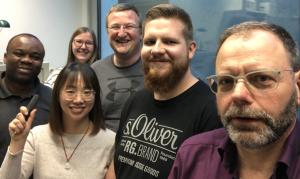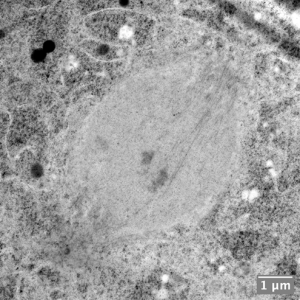24 October 2023

The mitotic spindle is crucial for proper chromosome segregation during cell division. Chromosome segregation takes place in anaphase and previous work has shown that the speed of this process depends on the structure of the spindle. Yitong Xu is a graduate student in Stefano Di Talia’s lab at Duke University, where she studies mitosis and microtubule dynamics in Drosophila melanogaster embryos. Yitong recently used a Travelling Fellowship from Journal of Cell Science to visit Dr Thomas Mueller-Reichert’s lab at the Technische Universität Dresden (TUD) in Germany, to conduct cryogenic electron microscopy (cryo-EM) observations of the Drosophila spindle.
The Travelling Fellowship from Journal of Cell Science meant Yitong could gain insight into the methodology and techniques needed to reveal the 3D structure of the mitotic spindle at high resolution. Thomas Mueller-Reichert and his lab guided Yitong through the complex and delicate steps of cryo-EM, providing her with a brand-new skill set which would benefit her future studies. Together, they established an effective routine for freezing embryos in liquid nitrogen under high pressure. The hands-on lab experience culminated with a rewarding moment when Yitong got to see the first cryo-EM generated image of high-resolution single microtubules inside D. melanogaster.
“I was thrilled to witness the first image of single microtubules in a fly embryo together with my colleague, Dr Gunar Fabig”, Yitong said.

Yitong described that there were many technical challenges experienced during the lab work but working with fellow scientists as a team, they were able to conduct high-pressure freezing of good quality and ensure the subcellular structures inside D. melanogaster were well-preserved. In addition to this, Yitong and colleagues collected electron tomograms for segmentation of microtubules, which she is actively working on after coming back to work with us.
“It has been an invaluable experience for me to work in Dresden, both from a scientific and lifestyle perspective. I got the chance to apply a classic technique to a new organism, uncovering a beautiful ultrastructure that I am fascinated with”, Yitong added.
Overall, the Travelling Fellowship from Journal of Cell Science provided a valuable opportunity for Yitong to acquire new skills and collaborate with fellow scientists. The experience contributed significantly to both her PhD project and personal growth.








You must be logged in to post a comment.